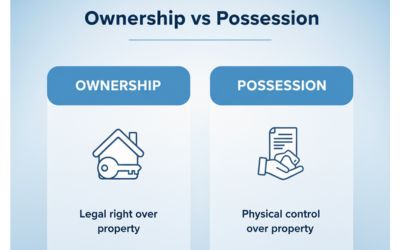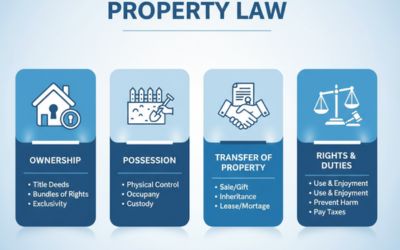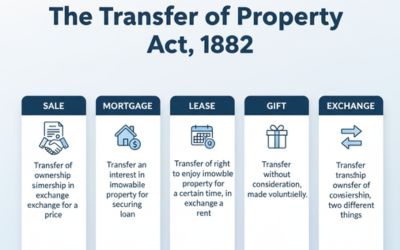Case Summaries
Facts: Shantabai’s husband gave her rights through an unregistered document to cut bamboo and teak for 12.5 years. The government took over the forest under a law, and the Forest Officer stopped her.
Issue: Was Shantabai’s right over movable or immovable property?
Decision: The court held that Shantabai’s right was over immovable property since it involved long-term growth and nurturing of the trees. Since the document wasn’t registered, her right couldn’t be enforced.
Facts: Ananda Behera had the right to fish in a specific pond or water body. The question in the case was whether his fishing rights were movable or immovable property.
Issue: Are fishing rights considered movable property (things you can separate and move) or immovable property (things connected to the land)?
Decision: The court decided that fishing rights are immovable property. This is because these rights come from the land and can’t be separated from it. The court said that anything that provides a long-term benefit from the land is considered immovable property.
Facts: The case was about whether the right to cut and take bamboo from a forest should be taxed. The government said bamboo was movable property, so it could be taxed like goods.
Issue: Titaghur Paper Mills argued that the bamboo license was not a contract to buy or sell goods, but a lease of land. They said it gave them the right to benefit from the land, called "Profit-a-prendre."
Decision: The court agreed with Titaghur Paper Mills. It decided that the license to cut bamboo was an interest in immovable property (like a lease), not a sale of goods, so it could not be taxed as a sale.
Facts: A family made an agreement, saying that the property each person got could not be sold to anyone outside the family. They decided that the property would pass down to their legal heirs (children, grandchildren, etc.) from generation to generation.
Issue: The question was whether this agreement, which restricted selling the property to outsiders, was legally valid.
Decision: The court said that according to Section 10 of the Transfer of Property Act, a partial restriction on selling property is allowed. So, as long as the agreement doesn’t completely stop the person from transferring the property, it is valid and enforceable.
Key Facts: The dispute arose when a transfer deed included a condition restricting the owner from transferring the property outside the family. The intention was to keep the property within the family for future generations.
Decision: The court addressed this by examining Section 10 of the Transfer of Property Act. It clarified that an absolute restriction on transferring property is generally considered void unless it's a specific, reasonable limitation. The court ruled that partial restrictions that allow transfers within a limited context, such as within family members, are valid.
Decision: The court said that an unborn child in the mother’s womb is considered a person for property transfers. This means transfers can be made to children who are yet to be born, as long as they are in the womb.
Facts:
- A woman (A) gifted her property to her nephew’s daughter (B) for her lifetime.
- After B’s life, the property was to go to B’s male children if she had any.
- If B had no male children, the property would go to B’s daughter, but B’s daughter was not allowed to sell or transfer it.
- If B had no children at all, the property would go to A’s nephew.
- B died without any children.
Judgment:
- The court said that the gift to B for her lifetime was valid because B was alive when the transfer was made.
- However, the gift to B’s daughter was invalid under Section 13 of the Transfer of Property Act (TPA) because the daughter was only given limited rights, not full ownership.
- Since the transfer to B’s daughter was not valid, any further transfer that depended on it (like to A’s nephew) also failed.
In simple terms, the court allowed the gift to B because she was alive, but the gift to B’s future children didn’t work because it was not giving them full rights.
Facts: A person made a gift of property to someone else (the transferee) but said that the transferee will only get possession of the property after the transferor (the person giving the gift) dies.
Judgment: The court said that the transferee still has a vested interest (a legal right to the property) even though they cannot enjoy or use the property until the transferor dies.
Conclusion: The person receiving the gift has the right to the property from the moment the gift is made, but they will only be able to take possession and use it after the giver passes away.
Facts:
- A transferred an estate to B. Both A and B were to enjoy the estate together during A’s lifetime.
- B was responsible for collecting rent, making repairs, and paying taxes. After these expenses, the remaining money was to be shared equally between A and B.
- A and B could transfer the estate jointly, but B died before any further transfer.
- After B’s death, A cancelled the transfer and gave the estate to D.
- B’s legal heirs filed a case claiming that B had a vested interest in the estate, and that interest should be passed to B's beneficiaries.
Judgment:
- The Supreme Court decided that A still had some rights in the estate and had not completely transferred the estate to B.
- The court ruled that B’s rights in the estate were not heritable (they didn’t pass to B’s heirs).
- Therefore, B’s heirs had no claim to the estate, and the court dismissed their case.
Conclusion:
- In this case, the entitlements made in favor of B were not permanent or heritable.
- A still had some control over the property, so B’s beneficiaries had no rights after B’s death.
- The decision is based on principles of justice, equity, and good conscience that guide the Transfer of Property Act.
Decision: The SC held that the question of election arises only when the transferee takes the benefit directly under the transaction.
Facts:
- Alexander paid for a property but registered it in his lover Bunnoo Bebee’s name, making her the Benamidar (holding the property on his behalf).
- Bunnoo Bebee sold the property to Ramdhan while Alexander was still alive.
- After Alexander’s death, his daughter Maria inherited the property through his will. But by then, the property had already been sold to Ramcoomar, who believed he was the rightful owner.
Issue: Maria sued Ramcoomar to get the property back, claiming it belonged to her father.
Decision: The court ruled that Maria could not take back the property. The sale was considered valid because Alexander, the real owner, had allowed Bunnoo Bebee to act as the owner, and Ramcoomar bought it in good faith, not knowing the real situation.
Conclusion: The case shows that if a person appears to be the owner and the buyer acts in good faith, the transfer is valid under Section 41 of the Transfer of Property Act, even if the seller wasn’t the true owner.
Facts: In this case, a property was being disputed in court. One of the parties tried to transfer the property during the case.
Issue: The question was whether transferring the property while the case was still going on affected the rights of the other party.
Judgment: The court said that just because a case is ongoing doesn’t mean a party can’t deal with the property. However, the court made it clear that any transfer done during a pending case would not change the final rights of the other party as decided by the court. So, the transfer is valid but must follow whatever the court finally decides.
Facts: In this case, Kamalammal owned a piece of land, and there was a court case going on regarding the ownership of this land. While the case was still in progress, Kamalammal sold the land to Senthil.
Issue: The question was whether Senthil could claim ownership of the land even though it was sold during a court case about the same land.
Judgment: The court applied Section 52 (Doctrine of Lis Pendens) and ruled that the sale made during the court case was not valid against the final court decision. The court decided that Senthil had to accept the court’s ruling, and his ownership depended on the outcome of the case.
Judgment: In this case, the court held that if a debtor delays the creditors by making transfers that avoid paying them, Section 53 can be applied to make those transfers invalid.
Summary: Section 53 protects creditors from being cheated by owners who try to hide or transfer their property to avoid paying debts. If the owner acts dishonestly, creditors can go to court and cancel the transfer. But, if the buyer did everything in good faith, their rights are protected.
Facts:
- A transferred an estate to B. Both A and B were to enjoy the estate together during A’s lifetime.
- B was responsible for collecting rent, making repairs, and paying taxes. After these expenses, the remaining money was to be shared equally between A and B.
- A and B could transfer the estate jointly, but B died before any further transfer.
- After B’s death, A cancelled the transfer and gave the estate to D.
- B’s legal heirs filed a case claiming that B had a vested interest in the estate, and that interest should be passed to B's beneficiaries.
Judgment:
- The Supreme Court decided that A still had some rights in the estate and had not completely transferred the estate to B.
- The court ruled that B’s rights in the estate were not heritable (they didn’t pass to B’s heirs).
- Therefore, B’s heirs had no claim to the estate, and the court dismissed their case.
Conclusion:
- In this case, the entitlements made in favor of B were not permanent or heritable.
- A still had some control over the property, so B’s beneficiaries had no rights after B’s death.
- The decision is based on principles of justice, equity, and good conscience that guide the Transfer of Property Act.
Decision: The SC held that the question of election arises only when the transferee takes the benefit directly under the transaction.
Facts:
- Alexander paid for a property but registered it in his lover Bunnoo Bebee’s name, making her the Benamidar (holding the property on his behalf).
- Bunnoo Bebee sold the property to Ramdhan while Alexander was still alive.
- After Alexander’s death, his daughter Maria inherited the property through his will. But by then, the property had already been sold to Ramcoomar, who believed he was the rightful owner.
Issue: Maria sued Ramcoomar to get the property back, claiming it belonged to her father.
Decision: The court ruled that Maria could not take back the property. The sale was considered valid because Alexander, the real owner, had allowed Bunnoo Bebee to act as the owner, and Ramcoomar bought it in good faith, not knowing the real situation.
Conclusion: The case shows that if a person appears to be the owner and the buyer acts in good faith, the transfer is valid under Section 41 of the Transfer of Property Act, even if the seller wasn’t the true owner.
Facts: In this case, a property was being disputed in court. One of the parties tried to transfer the property during the case.
Issue: The question was whether transferring the property while the case was still going on affected the rights of the other party.
Judgment: The court said that just because a case is ongoing doesn’t mean a party can’t deal with the property. However, the court made it clear that any transfer done during a pending case would not change the final rights of the other party as decided by the court. So, the transfer is valid but must follow whatever the court finally decides.
Facts: In this case, Kamalammal owned a piece of land, and there was a court case going on regarding the ownership of this land. While the case was still in progress, Kamalammal sold the land to Senthil.
Issue: The question was whether Senthil could claim ownership of the land even though it was sold during a court case about the same land.
Judgment: The court applied Section 52 (Doctrine of Lis Pendens) and ruled that the sale made during the court case was not valid against the final court decision. The court decided that Senthil had to accept the court’s ruling, and his ownership depended on the outcome of the case.
Judgment: In this case, the court held that if a debtor delays the creditors by making transfers that avoid paying them, Section 53 can be applied to make those transfers invalid.
Summary: Section 53 protects creditors from being cheated by owners who try to hide or transfer their property to avoid paying debts. If the owner acts dishonestly, creditors can go to court and cancel the transfer. But, if the buyer did everything in good faith, their rights are protected.
Facts: A dispute arose when the transferee claimed possession of the property based on an agreement, even though the sale deed wasn’t registered.
Held: The Supreme Court applied Section 53A and protected the possession of the transferee, emphasizing that the legal paperwork delay shouldn’t harm someone who acted in good faith.
Legal Principle: Part Performance doctrine provides protection to transferees who fulfill their obligations, even if the final sale deed isn’t ready.
Facts: Ameer Minhaj had a written agreement to purchase a property, and he took possession of it. Later, a dispute arose over the final registration of the sale deed.
Held: The court ruled in favor of Ameer Minhaj, stating that as long as he had a written agreement and fulfilled his part, he could not be dispossessed.
Legal Principle: Section 53A prevents the transferor from taking back the property if the transferee has followed through on their side of the deal.
Facts: This case, decided by the Privy Council, involved a situation where the transferee had a written agreement and had taken steps to fulfill their obligations.
Held: The Privy Council applied Section 53A and ruled that the transferee’s possession must be protected, emphasizing the importance of fulfilling agreements in good faith.
Facts: The plaintiff filed a case to cancel a sale deed, claiming that although the sale deed mentioned payment, the money was never actually paid. The defendant argued that if the court found the payment was not made, the plaintiff should still be required to accept the payment now, instead of cancelling the sale deed.
Issue: Should the court allow the defendant to request that the plaintiff accept the payment now and not cancel the sale deed?
Held: The court rejected the defendant's request, ruling that the sale deed was void due to non-payment, and it would be unfair to force the plaintiff to accept payment at this stage.
Facts: Muhammed Rafeeq bought a property from a borrower who had taken a loan from the bank. The bank had created a security interest over that property.
Issue: Muhammed Rafeeq tried to use the Rule of Marshalling to clear the property of debts.
Decision: The court ruled that since the SARFAESI Act, 2002 (an act about banks’ recovery of debts) applied in this case, the Rule of Marshalling could not be used.
Decision: In this case, the Supreme Court said that a charge on a property means that the property is used as security for payment but without transferring any ownership or interest in the property.
On the other hand, a mortgage transfers ownership or interest in the property. The court also explained that to create a charge, there is no special wording required, but there must be a clear intention to use the property as security for payment at the present time.
Facts: In this case, a minor (15 years old) was involved in executing a mortgage for an amount of ₹7,000. The court found that this mortgage was invalid because a minor cannot legally enter into a mortgage contract.
Court's Decision: The court said that a mortgage is like a contract, and since a minor doesn’t have the legal capacity to make such agreements, the mortgage was void (invalid). A minor needs to be represented by their legal guardian or someone appointed by the court to enter into such agreements.
Decision: In this case, the Madras High Court said that even though Section 130 doesn’t say exactly what words to use for a transfer, the intention to transfer must be clear. The document should make it easy to understand that the transfer is happening, even if specific words aren’t used.
Summary: Actionable claims are claims to money or benefits that are not secured by property. They can be transferred through a written document, and the new owner gets all the rights to claim the debt or benefit.













































































































Comment
Nothing for now